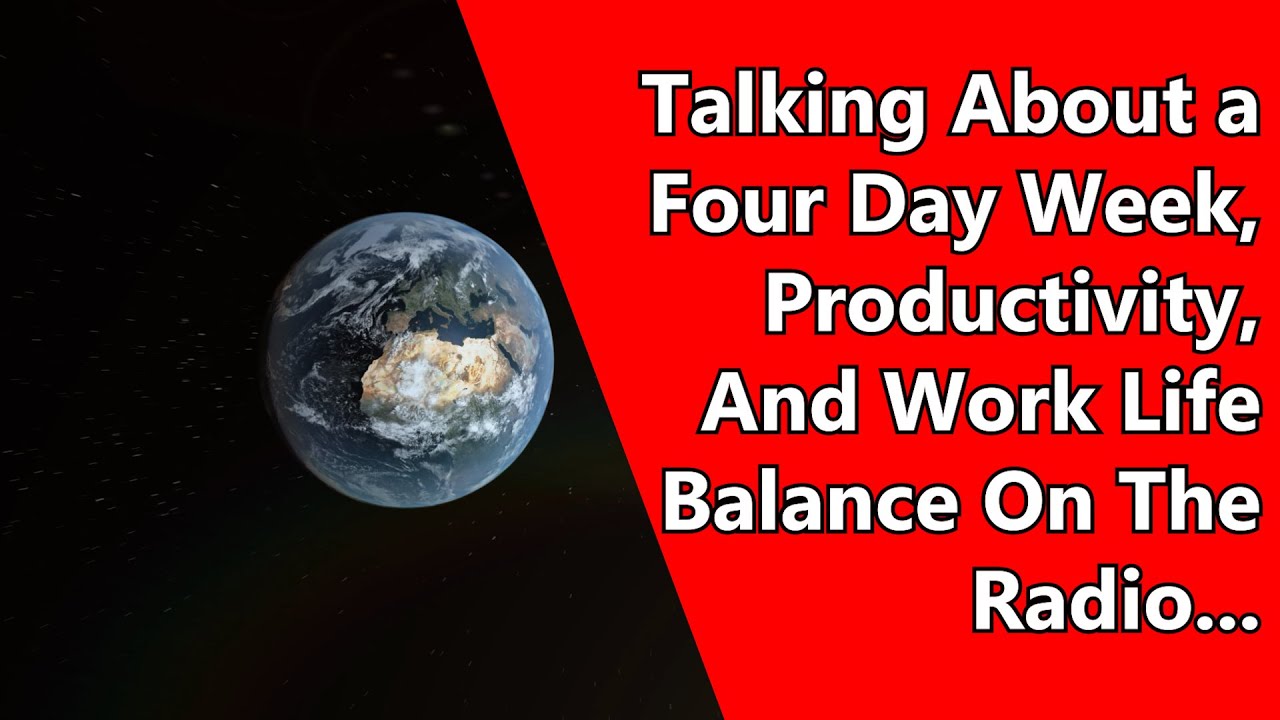Talking About A Four Day Week, Productivity, And Work Life Balance On The Radio...
Unleash Your Creative Genius with MuseMind: Your AI-Powered Content Creation Copilot. Try now! 🚀
It's that time again – Friday afternoon at four o'clock, and you're gearing up to finish your workweek. But what if I told you that just yesterday, you were already locking your sights on a three-day weekend? Not just on the occasional Good Friday or odd public holiday, but every single week. Intriguing, right? Well, hold on to your hats because there's a committee out there recommending a trial program that might just revolutionize the way we work: a four-day workweek.
The 4-Day Workweek: A Bold Experiment
So, you might be wondering what's the catch with this four-day workweek. You're not alone in your curiosity. Many have already embarked on this journey. If you're one of them, we want to hear from you. What are the pros, and are there any cons? Did you have to make sacrifices, maybe a bit of income or a little rearranging of your life? But let's not get ahead of ourselves. First, let's dissect this "180 100" principle.
The 180 100 Principle: A Productivity Conundrum
The idea behind the 180 100 principle may sound like a challenging diet, but it's all about maintaining 100% productivity while working only 80% of the time. In essence, you get paid the same but work four days instead of five. It's a thought-provoking concept, but the question remains: can we really boost productivity and maintain the same level of output in less time? Studies from around the world suggest that it's not only possible but might even lead to increased productivity. Less time commuting, longer work hours per day, and the flexibility of remote work are all contributing factors.
Paid Parental Leave: Nurturing a Balanced Society
Now, let's dive into another radical recommendation from the committee – 52 weeks of paid parental leave. That's an entire year of paid leave, and it's not just for the one giving birth; it extends to the partner as well. This suggestion aims to address gender pay inequity and the challenges women face when taking time off for childcare. But the million-dollar question is, who's going to foot the bill? Will it be the government, employers, or a combination of both? It's a complex financial puzzle that needs solving.
A Work-Life Balance Revolution
Beyond the four-day workweek and extended parental leave, this report, aptly named the "Work and Care Report," highlights the need for a more balanced approach to work and life. In a society where we all have caregiving responsibilities, be it for aging parents, family members with disabilities, children, friends, or even ourselves, fitting it all into the limited hours outside of work can be a daunting task. The report suggests that we need a stable and consistent roster to better accommodate these responsibilities.
Charting a New Course
In conclusion, the proposed changes in this report aim to redefine the way we perceive work, productivity, and societal values. It calls for a shift away from the traditional 38-hour workweek, prioritizing work-life balance, and acknowledging the importance of caregiving in our lives. While these recommendations are revolutionary, they raise significant questions about how they will be implemented, who will bear the financial burden, and how businesses will adapt to these changes. It's a complex journey towards a more balanced society, but it's one that's long overdue.
So, the next time you clock out on a Friday afternoon, imagine a future where every week feels like a long weekend, and caregiving responsibilities are fully supported. It might be closer than you think, and it's a vision worth exploring.

Related Recaps
- MK1: TUDO O QUE VOCÊ NÃO VIU NO TRAILER - ANÁLISE COMPLETA
- ONU advirtió a México sobre condiciones de migrantes detenidos ante la tragedia en Ciudad Juárez
- அரசுக்கு பதில் இந்த பாலை தனியாருக்கு கொடுத்தால் அதிக லாபம் வரும் - உற்பத்தியாளர்கள் அதிரடி
- TRAVEL VLOG || OWERRI~PORT HARCOURT~KANO FOR NYSC ORIENTATION CAMP #kano #nysc #airport
- 'I Wish The Administration Would Do Something': John Thune Slams Biden Over Lacking Trade In Asia